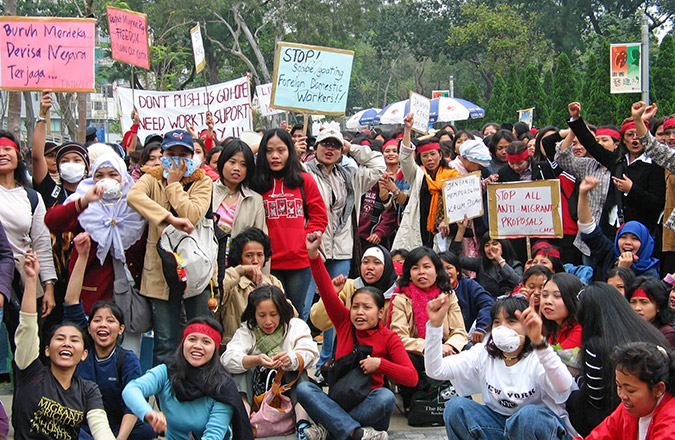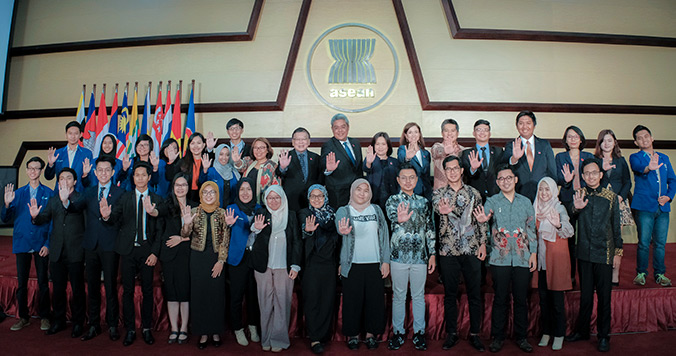ASEAN inter-sectoral coordination for Women Migrant Workers in crisis
Date:
Author: Chris Dickson
Women migrant workers face particular challenges at the cross-section of several sectors: gender, migration, health, justice and others. To address this, ASEAN has initiated better coordination between its agencies responsible for women's rights, migrant workers and the protection of children, as well as disaster management. The aim is to improve the protection of women migrant workers' rights and their access to services, in particular in times of crisis.
Manila, Philippines — Women migrant workers face all the same difficulties as others, but their lives are made even harder by a range of risks that are specific to or exacerbated by their gender. The most obvious of these are women's exposure to labour exploitation, sex trafficking and gender-based violence. But there is also wider exclusion of women and girls from the services and protection that they have a right to access. And this is made worse in times of crisis, especially for those that are not documented.

During recent floods in Thailand, at least one Cambodian worker decided to stay put and brave the rising waters rather than risk running into the authorities. "I was afraid to leave my house for help during the floods because the police might find me," said Bopha, who tends a street stall. She was cited as part of a recent scoping study to investigate the needs of women migrant workers and their children in the Association of Southeast Asian Nations (ASEAN). The study, which aimed to highlight the ways ASEAN can help their protection and empowerment, was conducted by Dalberg Global Development Advisors with support from UN Women and ASEAN.
Even when subjected to abuse by employers or other locals, women migrant workers tend to avoid seeking official help, according to the study. "Why would I go to the police, when they're only out to get me?" said Champa, a factory worker from Myanmar.
The study also found that part of what makes women more vulnerable is their tendency to remit more of their earnings home than men do - up to 17 per cent more. This leaves them with less money available to deal with shocks and crises in the countries where they work. "Everything I earned I sent home," Kolad, another Cambodian migrant, was quoted as saying by the research.
These challenges facing women migrant workers are part a complex web of compounding factors: vulnerability to exploitation, a distrust of officials, isolation, a lack of access to basic legal services and healthcare, and more.
A coordinated cross-sectoral approach is therefore essential to better safeguard their rights in this context. To this end, a first joint meeting on the topic was held in Manila on December 15 by representatives from four sectoral bodies of ASEAN: the Commission on the Promotion and Protection of the Rights of Women and Children; the Committee on Women; the Committee on Migrant Workers; and the Committee on Disaster Management.

The delegates discussed the recommendations of the study, notably: that some policies and regulations already in place could be improved and better enforced to help give women migrant workers access to protection available in host countries; that ASEAN could help by making it easier for them to secure formal employment, thus avoiding the risks of the informal sector; and that networks could be built to improve trust, awareness and mutual support, both in the host countries and back home.
All of the challenges faced by women migrant workers are made worse in times of crisis, where it is the most vulnerable who are at the biggest risk of being left behind by support structures in the host country. A crisis can be a natural disaster, as in the case of the Thailand floods, but it can also be a medical emergency, a forced displacement, or a period of extreme financial hardship. Migrant workers without the proper documentation find their access to support and protection particularly difficult. For example, the likelihood of not having access to a doctor when needed rises by 20 per cent for undocumented migrants, according to the scoping study.
Furthermore, the isolation suffered by migrant workers is as much of an obstacle as anything else. "When the government was giving out food after the floods, I couldn't understand the announcements," another migrant worker in Thailand was quoted as saying in the study. "By the time I got there, the food was finished."
In all these circumstances, better integration and support can be provided not just by official policies, but also by the civil society sector. Local groups led by current or former migrant workers are already paving the way. "I am empowered because I had access to education and have been treated well," said Mia, a domestic worker from Myanmar, and a community organizer for the sector in Thailand. "I know maybe 300 domestic workers here in the city who I try to help." While ASEAN and other agencies are moving to improve the longer-term protection of their rights, groups like hers are effecting change on the ground in the meantime. "Women migrant workers are more receptive to warnings and information that comes from someone they trust," she said.
For more information, contact;
Sukanya Thongthumrong, Officer-in-Charge
Regional Migration and Women's Economic Empowerment
UN Women Regional Office for Asia and the Pacific
Tel: +66 2 288 1383 | E-mail: [ Click to reveal ]